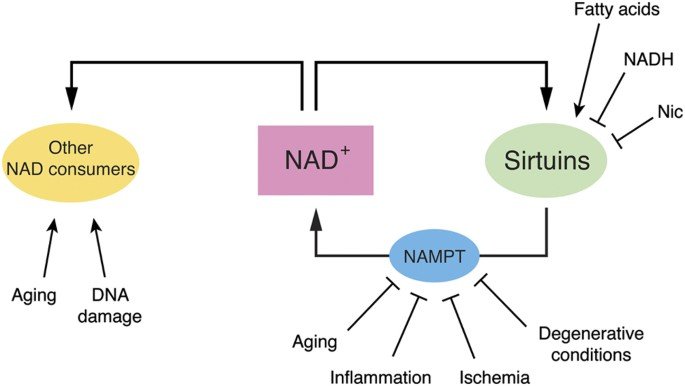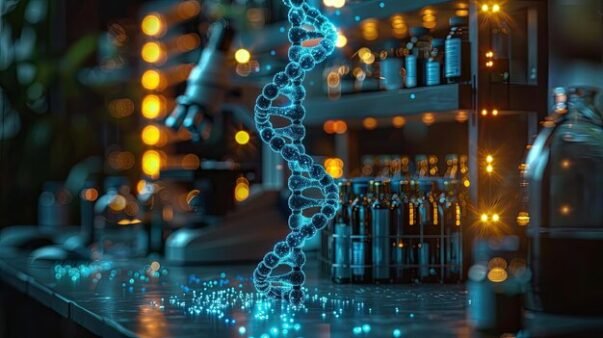
Sirtuins and NAD+ in Cancer Prevention and Treatment
Sirtuins and Their Role in Cancer
Sirtuins are a family of proteins (SIRT1 to SIRT7) that play a key role in cellular health by regulating important processes such as DNA repair, metabolism, aging, and stress resistance. They depend on nicotinamide adenine dinucleotide (NAD+), a molecule essential for energy production and cellular repair. Sirtuins are believed to help protect against age-related diseases, including cancer, by maintaining cellular homeostasis.
In cancer, sirtuins have a dual role. In some contexts, they act as tumor suppressors by promoting DNA repair and inhibiting cell proliferation. For example, SIRT1 has been shown to suppress tumor growth by enhancing the stability of the tumor suppressor protein p53, which plays a key role in preventing damaged cells from becoming cancerous. However, in other cases, certain sirtuins may promote cancer development by supporting cancer cell survival in stressful environments, such as those with limited oxygen or nutrients.
NAD+ and Its Role in Cancer
NAD+ is a critical coenzyme found in all living cells, playing a central role in energy metabolism and DNA repair. Low levels of NAD+ are associated with aging and various age-related diseases, including cancer. NAD+ is required for the activity of sirtuins, and boosting NAD+ levels has been shown to enhance DNA repair and improve cellular function, potentially reducing the risk of cancer development.
Research has indicated that NAD+ supplementation, or stimulating its production through precursors like nicotinamide riboside (NR) or nicotinamide mononucleotide (NMN), may help in protecting cells from age-related decline and possibly reduce the onset of cancer. NAD+ also helps to counteract the inflammatory responses that contribute to cancer progression, thereby potentially acting as a cancer preventive agent.
Research on Sirtuins, NAD+, and Breast Cancer
Some research has focused specifically on the relationship between sirtuins, NAD+, and breast cancer.
- Sirtuins in Breast Cancer: Sirtuins, particularly SIRT1, have shown potential protective effects against breast cancer. Studies have suggested that SIRT1 acts as a tumor suppressor by regulating pathways that control cell growth and apoptosis (programmed cell death). Additionally, SIRT3 has been implicated in reducing oxidative stress, which may help prevent breast cancer cell proliferation. However, the role of sirtuins can be complex, as in certain cancers, they may contribute to tumor survival by enabling cells to cope with stress, making the therapeutic use of sirtuins context-dependent.
- NAD+ in Breast Cancer: As NAD+ is essential for DNA repair and cellular metabolism, there has been growing interest in exploring its role in breast cancer prevention and treatment. Low NAD+ levels have been linked to impaired DNA repair mechanisms, which could contribute to cancer development. Preclinical studies have shown that increasing NAD+ levels can promote genomic stability and enhance DNA repair, which could be critical in preventing the initiation of breast cancer. However, direct clinical evidence linking NAD+ supplementation to breast cancer prevention is still in its early stages, and more human trials are needed.
Current Research and Effectiveness
Though promising, research on the use of sirtuins and NAD+ in preventing and treating breast cancer is still in relatively early stages. Studies in animal models have shown that boosting NAD+ levels and activating sirtuins can enhance DNA repair and reduce cancerous mutations, suggesting a potential protective role. However, clinical trials in humans are limited, and more research is needed to establish their effectiveness in breast cancer prevention and treatment.
There are ongoing efforts to investigate whether NAD+ boosters, such as nicotinamide riboside (NR) and NMN, and sirtuin activators can be used as therapeutic interventions for breast cancer. Some early trials have indicated that these interventions may help slow down the progression of certain types of breast cancer, but these findings require further validation in larger clinical studies.
Conclusion
Sirtuins and NAD+ are emerging as important factors in cancer biology, with potential roles in preventing and treating cancer, including breast cancer. While the mechanisms by which they operate are being understood, and early preclinical results are promising, more comprehensive research and clinical trials are needed to determine their long-term effectiveness and safety as cancer therapies.





Leave a Reply